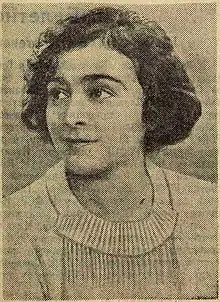Arsha Ovanesova
Arsha Amartsumovna Ovanesova (Armenian: Արշա Օվանեսովա, Russian: Ованесова, Арша Амбарцумовна; 1906 – 1990) was a Soviet Armenian documentary film director, screenplay writer, actress, and educator.[1]
Arsha Ovanesova | |
|---|---|
Արշա Օվանեսովա | |
 | |
| Born | December 23, 1906 Russian Empire (now Azerbaijan) |
| Died | May 6, 1990 (aged 83) Moscow, Soviet Union |
| Burial place | Troyekurovskoye Cemetery |
| Other names | Arsha Amartsumovna Ovanesova, A. Ovanesova |
| Education | Gerasimov Institute of Cinematography |
| Occupation(s) | Film director, screenplay writer, actress |
| Spouse | Semyon Sheynin |
| Children | 2 |
Biography
Arsha Ovanesova was born on December 23, 1906, in either Shusha or Baku, in the Russian Empire (now Azerbaijan).[2] At the age of 13, her mother died. From 1918 to 1919, she lived in Persia to escape the Russian Revolution and the Islamic Army of the Caucasus; followed by a moved in 1920 to Baku.
She attended Gerasimov Institute of Cinematography (VGIK) from 1926 to 1932, where she graduated from.[3] From 1931 to 1961, Ovanesova was a director at the Soyuzkinohronika (now Russian Central Studio of Documentary Films).[3] She helped found Pioneer (newsreel), as well as serving as the director and editor of the filmed newsreel from 1931 to 1946.[3][4][5] Her film Unusual Encounters (1958) traces the lives of the people in the early publication of Pioneer, spanning 20 years.[5] She taught film at Gerasimov Institute of Cinematography,[5] starting in 1947.
In 1943, she became a member of the Communist Party of the Soviet Union (CPSU).[5] She was a Honored Art Worker of the RSFSR (1947).[5] In 1950 she received the Stalin Prize (later known as the USSR State Prize) and the International Peace Prize.[5]
She died on May 6, 1990, and is buried at Troyekurovskoye Cemetery in Moscow.[6] Ovanesova was married to cameraman Semyon Sheynin, who survived her.[3]
Filmography
Writer
Director
- 1940, Pioneer Truth (Russian: Пионерская правда)[5]
- 1946, A Story About Our Children (Russian: Повесть о наших детях)[5]
- 1948, 30 Years of the Komsomol (Russian: 30 лет комсомола)[5]
- 1949, World Youth Festival (Russian: Юность мира, romanized: Youth of the World), a documentary about the World Festival of Youth and Students event.[7]
- 1958, Unusual Encounters (Russian: Необыкновенные встречи, lit. 'Usual Meeting')[5]
References
- "Арша Ованесова, 1906 — Режиссер". Кинопоиск (Kinopoisk). Retrieved 2022-06-24.
- "Arsha Ovanesova". Kinorium. Retrieved 2022-06-24.
- "Арша Ованесова". Кино-Театр.Ру (Kino-teatr.ru). Retrieved 2022-06-24.
- "ОВАНЕСОВА Арша Амбарцумовна". istoriya-kino.ru (in Russian). Archived from the original on 2021-10-30.
- Prokhorov, A.M., ed. (1979). "Arsha Ovanesova". The Great Soviet Encyclopedia (3 ed.). Moscow. OCLC 14476314.
{{cite book}}: CS1 maint: location missing publisher (link) - "ОВАНЕСОВА Арша Амбарцумовна (1906 – 1990)". moscow-tombs.ru (in Russian). Retrieved 2022-06-24.
- "'World Youth Festival,' New Soviet Documentary With Narration in English, Opens at Stanley". The New York Times. 1950-07-10. ISSN 0362-4331. Retrieved 2022-06-24.
- "Тайна горного озера, 1954". Кинопоиск (kinopoisk.ru) (in Russian). Retrieved 2022-06-26.